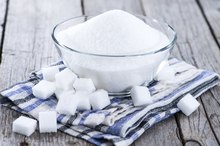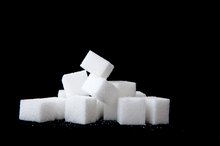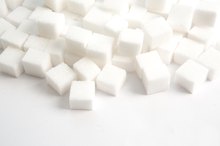What does fact checked mean?
At Healthfully, we strive to deliver objective content that is accurate and up-to-date. Our team periodically reviews articles in order to ensure content quality. The sources cited below consist of evidence from peer-reviewed journals, prominent medical organizations, academic associations, and government data.
- Centers for Disease Control and Prevention; Carbohydrates; February 2011
- American Heart Association; Frequently Asked Questions About Sugar; May 2010
- Mayo Clinic; Artificial Sweeteners: Understanding These and Other Sugar Substitutes; October 2010
The information contained on this site is for informational purposes only, and should not be used as a substitute for the advice of a professional health care provider. Please check with the appropriate physician regarding health questions and concerns. Although we strive to deliver accurate and up-to-date information, no guarantee to that effect is made.
What Are the Functions of Sucrose in the Body?
Sucrose is a sugar, a simple carbohydrate, found naturally in many fruits and vegetables. It can also be extracted from sugar cane and sugar beets, refined, and sold as white granulated sugar, which you can use in cooking. While sucrose does have some functions in the body, it also has some negative effects.
Positive Functions
Your body uses sucrose as fuel for energy, like it uses other, more complex carbohydrates. During digestion, your body breaks down carbohydrates like starch, fiber and sucrose into the sugar molecule glucose. When glucose enters your intestines, it is absorbed into the bloodstream and then taken into your body’s cells, where it is converted into energy. Naturally occurring sucrose, like that found in fruit, is not necessarily bad for you. However, a diet high in sugar can have negative effects on your body.
- Your body uses sucrose as fuel for energy, like it uses other, more complex carbohydrates.
- When glucose enters your intestines, it is absorbed into the bloodstream and then taken into your body’s cells, where it is converted into energy.
Negative Effects
The Side Effects of Sucrose
Learn More
According to the Centers for Disease Control and Prevention, sucrose can cause tooth decay because it fuels the bacteria that produce the plaque that causes cavities. Eating sucrose and other sugary foods can raise your risk of cavities and other dental problems. In addition, sucrose and other sugars are frequently added to processed foods to enhance flavor, increasing the calories but not the actual nutrients. This can lead to weight gain, particularly when these kinds of processed foods provide the bulk of your diet.
- According to the Centers for Disease Control and Prevention, sucrose can cause tooth decay because it fuels the bacteria that produce the plaque that causes cavities.
- In addition, sucrose and other sugars are frequently added to processed foods to enhance flavor, increasing the calories but not the actual nutrients.
Daily Amounts
The amount of sucrose you consume when eating fruits and vegetables is not usually excessive, but you do need to be careful when eating foods with added sucrose, especially sweets and processed foods. According to the American Heart Association, women should limit their intake of added sucrose and other sugars to fewer than 100 calories a day, or around 6 teaspoons. Men should consume no more than 150 calories from added sucrose, or around 9 teaspoons.
- The amount of sucrose you consume when eating fruits and vegetables is not usually excessive, but you do need to be careful when eating foods with added sucrose, especially sweets and processed foods.
- According to the American Heart Association, women should limit their intake of added sucrose and other sugars to fewer than 100 calories a day, or around 6 teaspoons.
Sucrose Substitutes
List of Carbohydrates in Fruits & Vegetables
Learn More
You can easily cut down on sucrose by using other sweeteners as substitutes for sugar 2. For example, instead of using white sugar in their morning cup of coffee, some people use aspartame or Splenda, two no-calorie sweeteners approved by the Food and Drug Administration. Many products that are typically high in added sugar, like soft drinks and ice cream, offer no-sucrose versions sweetened with a no-calorie sweetener. However, do not skimp on your fruits and vegetables just because they contain sucrose, as they are major sources of the vitamins and minerals you need to be healthy.
- You can easily cut down on sucrose by using other sweeteners as substitutes for sugar 2.
- Many products that are typically high in added sugar, like soft drinks and ice cream, offer no-sucrose versions sweetened with a no-calorie sweetener.
Related Articles
References
- American Heart Association; Frequently Asked Questions About Sugar; May 2010
- Mayo Clinic; Artificial Sweeteners: Understanding These and Other Sugar Substitutes; October 2010
- Rippe JM, Angelopoulos TJ. Sucrose, High-Fructose Corn Syrup, and Fructose, Their Metabolism and Potential Health Effects: What Do We Really Know? Adv Nutr. 2013;4(2):236-245. doi:10.3945/an.112.002824
- U.S. Department of Agriculture. Cut Down on Added Sugars. 2016.
- Rampersaud GC, Kim H, Gao Z, House LA. Knowledge, perceptions, and behaviors of adults concerning nonalcoholic beverages suggest some lack of comprehension related to sugars. Nutr Res. 2014;34(2):134-142. doi:10.1016/j.nutres.2013.11.004
- Tandel KR. Sugar substitutes: Health controversy over perceived benefits. J Pharmacol Pharmacother. 2011;2(4):236-243. doi:10.4103/0976-500X.85936
- Bray GA. Energy and Fructose From Beverages Sweetened With Sugar or High-Fructose Corn Syrup Pose a Health Risk for Some People. Adv Nutr. 2013;4(2):220-225. doi:10.3945/an.112.002816
- American Dental Association. American Dental Association Encouraged by Soda Makers’ Pledge to Promote Smaller Sizes, Less Sugar. 2014.
- U.S. Department of Health and Human Services and U.S. Department of Agriculture. 2015–2020 Dietary Guidelines for Americans. 8th Edition. 2015.
Writer Bio
Joseph McAllister has worked as a writer since 2003. He has more than seven years of experience in training and coaching martial arts. McAllister writes for various websites on a variety of topics including martial arts, competition and fitness. He graduated from Liberty University on a full ride National Merit Scholarship with a Bachelor of Science in print journalism.









